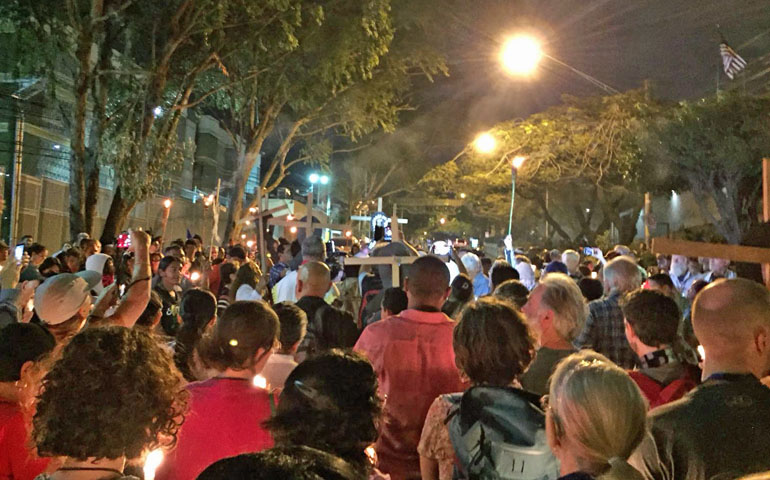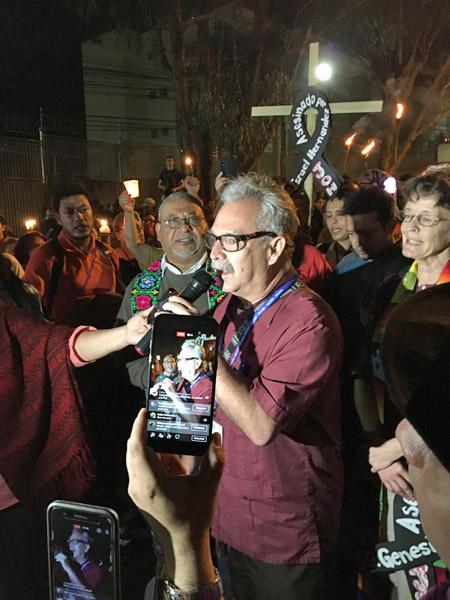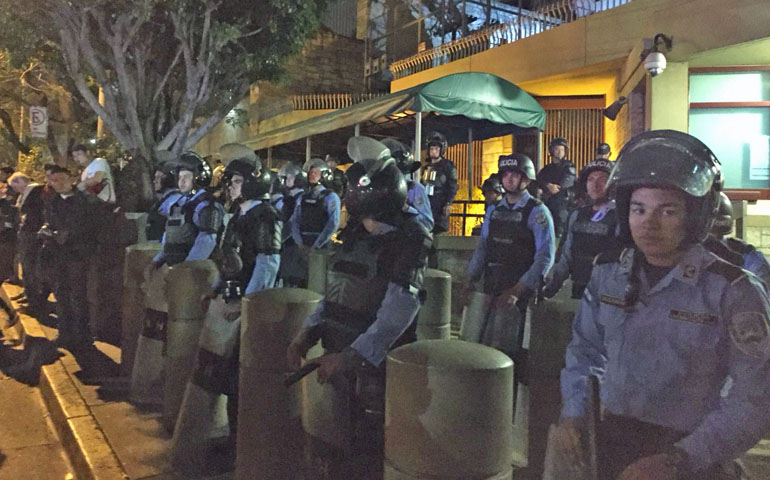
The crowd present at the vigil in Tegucigalpa, Honduras (Tom Webb)
After three days of intense listening, conversing and witnessing, members of the Emergency Religious Delegation to Honduras took a four-hour bus trip Jan. 28 from El Progreso to Tegucigalpa, Honduras, to deliver a report to the U.S. Embassy.
We arrived shortly before sunset at the Loyola Center and prepared for a nighttime vigil outside the embassy. This site also serves as the satellite for Radio Progreso, one of the few independent radio networks in Honduras which investigates, analyzes and reports on human rights violations, military misconduct and the work of environmental defenders throughout the country. The main station in El Progreso is directed by Jesuit Fr. Ismael Moreno, also known as Padre Melo, a native Honduran who is considered one of the leading voices for the poor and marginalized. Honduras is a desperately impoverished nation, with one out of five Hondurans in rural areas living on less than $1.90 a day, according to the World Bank.
At nightfall the delegation made their way through narrow and twisting streets to the embassy. We carried two six-foot-long orange banners with our delegation name proudly emblazoned on them. Several other people carried crosses with black ribbons bearing the names of seven of 33 civilians who have been killed in the post-election, government-ordered national repression.
It was difficult to avoid the heavily militarized state of this country. Over 100 heavily armed military and national police lined the sidewalk of the block-long embassy, arm-to-arm. Tear-gas guns and automatic weapons were menacingly displayed. The steps to the embassy were even more heavily guarded with several soldiers on each of the six steps to the main entrance.

Fr. Ismael Moreno and Jose Artiga at the vigil (Tom Webb)
Across from the fortified embassy a crowd of people were on the sidewalk. As our delegation drew closer they appeared to break rank and walked across Avenida La Paz to join us.
For the next two hours hymns were sung, speeches made and popular chants filled the warm night's air. Among the speakers were Moreno, Jose Artiga, a U.S. organizer of the delegation, Carlos Reyes, a leader of the Alliance Against Corruption, a coalition of several parties and several members of our delegation including Rev. Kathleen McTigue, a Unitarian minister, Mercy Sr. Kathleen Erickson, who currently ministers to migrants in Nebraska, Claire White, daughter of Robert White, the late American ambassador to El Salvador, and Rev. Daniel Buford, an Oakland-based pastor. Each spoke to the crowd which grew to nearly 500 people.
Following the speeches, we heard impassioned testimonies from a number of Hondurans who had experienced the brunt of the repression. I spoke to one woman whose son had been murdered. She carried his picture for all to see.
As the vigil continued, word spread that two water cannons had been parked around the corner of the embassy. This was yet another ominous warning of the precarious nature of peaceful, public demonstrations in this bitterly polarized country.

Military gathered at the vigil in Tegucigalpa (Tom Webb)
On Jan. 29, the delegation was scheduled to meet with U.S. Embassy officials. Unlike the previous evening when we approached the embassy, only a handful of military police could be seen.
The meeting was held in the U.S. Agency for International Development office across the street from the embassy. I'm sure I was not the only one who grimaced at the pictures of the smiling faces of President Donald Trump, Vice President Mike Pence and Secretary of State Rex Tillerson that greeted visitors as they entered the building.
We were fortunate to meet with chargé d'affaires Heide Fulton. With no new ambassador named for Honduras, Fulton is considered the temporary leader of the embassy. Along with Fulton were four other officers including Jason Smith, a human rights division manager.
Nine delegates were selected to speak. Among them were Jean Stokan of the Mercy Sisters Justice and Peace Office; her husband Scott Wright, who holds a similar position with the Columban Fathers; Claire White; Mercy Sr. Kathleen Erickson, Darrin Mortenson of the Maryknoll Office for Global Concerns; Kristen Lionetti and Jesuit Fr. Jean Denis Saint-Félix of Haiti, representing the Office of Justice and Ecology of the Jesuit Conference of Canada and the United States; Mary Anne Perrone*, representing The Latin America Task Force of Interfaith Council for Peace & Justice in Ann Arbor, Michigan; and Tom Haines, affiliated with the Mayflower United Church of Christ in Minneapolis.
Saint-Félix, Wright, White and Lionetti each spoke eloquently about the threats made against Moreno's life, including a distribution of a recent flyer to embassy officers which fatuously linked him with Mexican and Colombian drug cartels. Wright drew historical parallels between the disinformation campaigns directed against the Jesuits in El Salvador, prior to their murders in 1989, and the current threats to Moreno's life.
Mortenson spoke about the fevered militarism gripping Honduras, and the U.S. role in providing funding for security. Erickson, based on her years of work with migrant populations on the border and most recently in Nebraska, decried the U.S. threat to end temporary protective status for Honduran migrants. Lionetti echoed these concerns, and spoke about the U.S. efforts weakening international mechanisms to protect vulnerable global migrant populations. Haines spoke of the witness and concerns of Honduran youth we met, wondering what type of future the U.S. was offering them by its support for a dictator and his heavily militarized country.
Finally, Perrone* concluded by challenging the embassy officers if they had really heard what was said. Perrone pointed to the warnings given to U.S. government officials during the Carter, Reagan and Bush administrations about the growing crisis in the Salvadoran and Guatemalan conflicts of the '70s, '80s and early '90s by faith-based delegations and human rights advocates. Those warnings went unheeded, yet historically proved prophetic by United Nations investigations and national Truth and Reconciliation Commissions.
After listening to the delegation concerns, Fulton said she sought to correct the role of a human rights certification for Honduras, which is required annually because of the government's egregious record. In mid-December, following the announcement of President Juan Orlando Hernández's re-election, the U.S. State Department had re-certified improvements in Honduran human rights protections. Fulton observed that certification must be viewed on a continuum. She noted that the embassy doesn't support the current integration of civil police with the national military. She also pointed to projects like reform of the police, the recent arrests of three high-ranking officers and the hiring of a larger number of police as signs of improvement. She admitted that these steps were far from perfect but encouraged our delegation to see the positive steps being taken.
Stokan responded that these changes appeared more cosmetic rather than substantial, making them more akin to public relations stunts. Wright also pointed to the recent election which allowed Hernández to run for re-election after he stacked the Supreme Court with justices favorable to his ideology, followed by the "grave irregularities" the Organization of American States observed in the ballot-counting process also governed by members of Hernández's National Alliance. In all of this, a substantial American voice was clearly missing. Yet Wright argued that with U.S. knowledge of human rights concerns and other projects, it was quite possible for the U.S. to make a difference in the lives of the Honduran people. What seemed lacking was the political will.
Advertisement
We returned to the Loyola Center where a short debriefing was held. Moreno felt the meeting had been valuable. He applauded the strength and skill of our spokespeople communicating uncomfortable truths to power. He also noted that we had successfully broken through the Honduran and U.S. government narratives. Most hopefully, Fulton had expressed renewed interest in meeting with Moreno, following the cancelation of an earlier meeting in October 2017.
The long day ended with a delightful party held at the Radio Progreso facilities in El Progreso. In the marvelous Latin American tradition of drawing life from apparent death, a meal of pupusas (food similar to a pancake, filled with beans, chicken or vegetables) was served. It was followed by the exuberant tones of a marimba band, and Hondurans danced into the late hours of the evening.
[Tom Webb is a freelance writer and member of the Oakland Catholic Worker community.]
*This piece has been corrected the the right name of one of the delegates.







